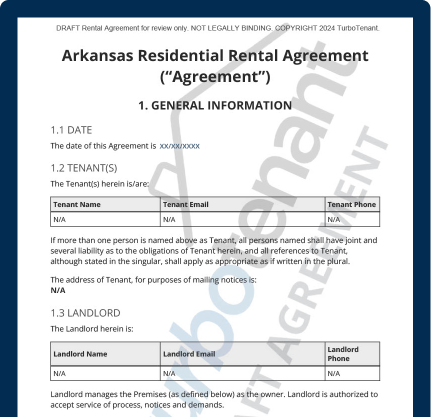If you’re a landlord or tenant in Arkansas, understanding landlord-tenant law is essential to renting property. Every state across the country develops laws that can significantly impact every aspect of the rental experience, including dictating rules about rent collection, security deposits, landlord entry, and more.
In this guide, we’ll review the key components of Arkansas landlord-tenant law, Arkansas tenant rights/responsibilities, the importance of Fair Housing laws, how maintenance and repairs typically work, lease agreements, and several other topics important to landlords and tenants in Arkansas.
If you’ve ever had a question about renting property in Arkansas, this guide is for you.
A TurboTenant account unlocks comprehensive tenant screening, document storage, expense tracking, and everything else landlords need.
Key Findings: Landlord-Tenant Rights & Responsibilities
One of the most critical components of Arkansas landlord-tenant law is how the state government defines the relationship between the property owner and the party renting the property.
These rights and responsibilities vary significantly from state to state. So, Arkansas landlords must understand how the rules of The Natural State dictate how they must operate their businesses.
Arkansas landlords have the right to:
- Collect rent as defined in the lease agreement, including due date, late fees (if applicable), and payment methods
- Enforce the lease as written. The lease becomes legally binding as soon as both parties sign it, and both parties must adhere to it as it’s written.
- Enter the property only for legitimate reasons and with reasonable notice, as Arkansas landlord-tenant law outlines.
- Evict tenants for lease violations per Arkansas eviction law.
- Retain security deposit funds for damage beyond normal wear and tear.
Arkansas landlords are responsible for:
- Abiding by the lease terms, just as tenants must do.
- Refraining from retaliation in response to tenant complaints or actions.
- Providing tenants with a habitable unit, which must include running water, electricity, heat, and trash removal.
- Making prompt repairs when a tenant requests them.
- Returning the remainder of the security deposit funds within 60 days of the tenant leaving the property.
Arkansas tenants have the right to:
- A written Arkansas lease agreement that explains the relevant information regarding the unit.
- Treatment that’s free of any discrimination or biases.
- Quiet enjoyment of the property, free from repeated entries by the landlord.
- Timely repairs when requested in writing.
- Protection against illegal eviction, since landlords must follow Arkansas law when removing a tenant.
Arkansas tenants are responsible for:
- Paying rent on time as outlined by the lease agreement.
- Maintaining the property to a reasonable degree, including removing trash and waste.
- Complying with the lease terms as signed by all parties.
- Giving proper notice before leaving the property.
- Refraining from conducting illegal activity or committing a lease violation on the property.
Best Practices for Screening Prospective Tenants
An important step when looking for a new tenant is conducting a proper background check and screening to ensure they’re the right one for your unit. It begins when the tenant fills out a rental application, for which landlords can charge a non-refundable fee to process.
Landlords in Arkansas are allowed to inquire about a tenant’s criminal and credit history as part of the application process to make a decision, but they must be careful not to discriminate against applicants when selecting a tenant to occupy their property.
Further, landlords must maintain consistent criteria across the board when screening tenants because the Fair Housing Act stipulates that no protected class receive preferential treatment when applying to property. So, it’s in a landlord’s best interest to use the same criteria for every single application. We’ll break this down a bit more in the following section.
A great way to stay compliant is by using TurboTenant’s tenant screening features. Simply send a link to your interested renters, and we’ll screen them using the same criteria, saving you potential headaches down the road.
Compliance with Fair Housing Laws in Arkansas
Federal landlord-tenant laws, separate from Arkansas landlord-tenant laws, ensure tenants and applicants can search for housing without fear of discrimination. These laws aim to give renters an equal playing field by ensuring landlords don’t favor one group over another.
What actions are considered housing discrimination?
The Federal Fair Housing Act identifies certain classes specifically protected from discrimination in housing. These protected classes are those defined by:
- Race
- Color
- National Origin
- Religion
- Sex (including gender identity and sexual orientation)
- Familial Status
- Disability
Landlords cannot use any of the above characteristics to decide who can move into a dwelling. This means landlords can’t offer different lease terms based on any of the above or advertise a unit expressing a preference for a specific group.
How can discrimination be avoided in rental practices?
Avoiding housing discrimination should be a straightforward part of renting out property. Landlords must establish fair and consistent screening practices that don’t consider any of the abovementioned characteristics. They should generally treat all applicants the same.
Any staff involved with the application and screening process for new tenants must be fully informed about fair housing laws and the consequences of violating them; landlords can be held liable for discriminatory actions taken by their employees.
What are the repercussions for fair housing violations?
Violating fair housing laws can result in serious legal and financial consequences for landlords and property owners. These include legal penalties, such as tenant lawsuits or government investigations, financial damages, and even reputational damage in the community.
If a prospective, current, or former tenant accuses you of discrimination, you should seek legal counsel or advice and cooperate with the investigation as much as possible.
Arkansas Lease Agreements
A key element of protecting Arkansas tenant rights is to provide tenants with a lease agreement for the rental, which establishes the rules of the road when renting out property.
While not strictly required to be in writing, committing a lease agreement to paper is always recommended to avoid any potential miscommunication that an oral lease could create.
There are two main types of lease agreements: fixed-term and month-to-month. A month-to-month lease is generally a flexible option for landlords and tenants. It allows either party to cancel the lease by providing at least 30 days’ written notice. A fixed-term lease is more rigid, expiring only on the last day of the term listed in the lease.
Which lease terms are legally required in Arkansas?
Lease agreements should contain a baseline of information that adheres to Arkansas landlord-tenant law and protects all parties, where possible. Some of these required lease terms include:
- Names of all parties
- Address and description of the property
- Rent amount and payment terms, including late fees or grace period
- Term of the lease, including end date
- Details regarding the security deposit
- Responsibility of utilities
What constitutes legal renting in Arkansas?
To be considered a legal rental, landlords must comply with local laws and meet specific standards. These include using a legally valid lease, obeying health and safety standards, meeting building codes, and adhering to occupancy limits.
What tenant documentation is required?
Arkansas tenant rights indicate that tenants must provide certain documents to be considered for a rental unit. These include:
- Valid ID
- Proof of income
- Application
- Credit history*
- Criminal background check*
- Eviction history*
Landlords should keep detailed records of the application process, including copies of the above documents, in case additional verification is needed.
*These are often included as part of the tenant screening process.
What are the mandatory landlord disclosures in Arkansas?
Many states across the country require landlords to make the tenant aware of certain elements of the property in the form of disclosures at the time of lease signing. These mandatory disclosures must be signed in accordance with local law.
Arkansas’s landlord-tenant law does not require any mandatory disclosures as part of the lease process; however, all landlords across the country must make one federally required disclosure. According to federal law, landlords must inform tenants about the existence or knowledge of any lead-based paint or lead-based paint hazards for any unit built prior to 1978.
Security Deposits in Arkansas
Security deposits are a major part of property rental. They act as financial protection for the landlord if the tenant breaks the lease early, commits a lease violation, or leaves the unit damaged or unclean.
What are the guidelines for security deposit collection?
Arkansas landlords are allowed to collect security deposits of up to 2 months’ rent. Although it is generally a good idea to provide a receipt or inform the tenant where the deposit is being held, they are not required to do so.
While not mandatory, landlords can provide tenants with a move-in checklist at the time of lease signing that can provide alignment on the physical condition of the property when the tenant moves in. This can be used as a baseline when the tenant moves out, allowing the landlord to determine if they must retain a portion (or all) of the security deposit to cover the cost of cleaning or repairs.
When can deductions be made from security deposits?
Landlords in Arkansas can retain funds from the security deposit for unpaid rent, late fees, damage excluding normal wear-and-tear, and costs due to noncompliance with the lease agreement.
How should security deposits be returned?
When reviewing the unit after a tenant has moved out, landlords can use a move-in checklist or photographic evidence as a point of comparison to calculate any deductions.
If the landlord intends to withhold any funds from the security deposit, they must give the tenant an itemized list of the deductions when they return the remaining funds. Landlords must return funds to the tenant within 60 days of the tenant leaving the property.
Maintenance Responsibilities of Landlords
Arkansas landlords are required by law to ensure that their rental units meet a minimum level of habitability and living standards. While Arkansas’s laws are somewhat more lax than other states, properties must meet the requirements below.
What are the legal standards for property conditions?
Arkansas tenant rights make it clear that all tenants deserve to rent a habitable unit that meets a minimum level of health and safety standards. These standards include:
- Plumbing and running water
- Heating
- Electrical systems
- Structural integrity
- Sanitation
- Smoke and carbon monoxide detectors
What is the proper protocol for repairs?
Since maintaining a rental unit in good repair is important, tenants have the right to request repairs from a landlord when an issue arises that challenges their right to quiet enjoyment of the property.
Arkansas law is relatively weak in protecting tenants when they request repairs. Tenants can request repairs from the landlord, but no legal requirement establishes a timeframe by which landlords must complete these requests.
Additionally, tenants in Arkansas are not allowed to “repair and deduct” when the landlord has not made a critical repair. Instead, tenants should address the issue with the court system, which could then issue an order to require the landlord to compensate the tenant for the repairs or offer an alternative solution.
Do landlords need to give tenants advance notice before accessing a rental property?
No laws dictate how or when a landlord may enter a tenant’s unit. Landlords are allowed to enter the unit for inspections, repairs, decorations, alterations, improvements, and showings. They can also enter the property in emergencies to prevent criminal activity, or to investigate potential lease violations.
While the legal protection is lax, landlords who repeatedly enter a tenant’s unit without notice could be liable for landlord harassment since it threatens the tenant’s right to quiet enjoyment. This could lead to legal or civil penalties for the landlord, including a potential cancellation of the lease agreement.
Late Rent Fee Regulations
Arkansas landlord-tenant law 2025 does not require landlords to provide tenants with a grace period to pay rent. As such, landlords can assess late fees immediately following the day rent is due, without limit, as long as that information is included in the lease agreement.
Rent Control in Arkansas
Rent control is when a state or local government restricts the amount that a landlord can raise the rent over time. Arkansas has no rent control laws, so landlords can raise the rent however they see fit once the lease agreement expires.
Landlords are allowed to raise the rent on a month-to-month lease as long as 30 days’ advance notice is given to the tenant. For a fixed-term lease, landlords can raise the rent immediately once the lease term expires, and no advance notice is required.
Lease Renewal and Termination
Since a lease is a legal contract, specific rules govern how it can end. For month-to-month leases, landlords or tenants can terminate the agreement if either party provides 30 days’ written notice. Fixed-term leases end on the last day of the rental term. No notice is required if the landlord does not intend to renew the lease. Arkansas landlords are not obligated to renew a lease once the term ends.
While a fixed-term lease only expires when the term ends, there are a few legally recognized situations in which a tenant can end the lease early and without penalty. For the lease termination to be legal, the tenant must meet specific requirements.
Some ways a tenant can end a lease early and without penalty are:
- Entering into active duty military service
- Domestic violence
- Uninhabitable unit
- Early termination clause
Landlords can also end a fixed-term lease early in a few circumstances, including:
- Tenant violates lease terms and triggers an eviction
- Landlord sells the property
- Landlord takes the property back for personal use
Eviction Procedures for Arkansas Landlords
Evictions are the legal process by which a landlord may remove a tenant from the rental property when the tenant fails to pay rent or has violated the lease. These proceedings can vary quite a bit from state to state, and landlords should follow the process as laid out by state law to avoid any issues.
What justifications exist for eviction?
Arkansas is a just cause (fault) eviction state, which means that the landlord must provide a valid reason (and evidence) to the court that the eviction is legal.
Landlords can evict a tenant for:
- Failure to pay rent
- Lease violations
- Illegal activity
- Holdover tenancy (refusing to leave when the lease term ends and without consent of the landlord)
No matter the reason for entering into the eviction process, landlords should keep detailed records of everything since it’s likely that evidence will be presented to a judge at some point during the proceeding.
What is the eviction process?
Once the landlord has determined to begin an eviction proceeding, the process is as follows:
- Deliver a notice to vacate.
- A 5-day notice to pay for nonpayment of rent. If the tenant doesn’t pay, the landlord has two options:
- Serve an unconditional notice to quit to the tenant to move out or face eviction.
- Pursue criminal action for failure to vacate by serving a 10-day notice to leave. If tenants don’t move out, they are guilty of a misdemeanor. If the tenant is convicted, the court can fine them up to $25 per day until they leave the premises.
- A 14-day notice to cure or quit for lease agreement violations
- A 14-day notice to cure an unsafe, unhealthy, or uninhabitable situation. If the situation isn’t remedied after 14 days, the landlord can file an eviction suit immediately.
- A 5-day notice to pay for nonpayment of rent. If the tenant doesn’t pay, the landlord has two options:
- File eviction lawsuit
- Attend a court hearing
- Obtain a Writ of Possession
- Tenant removal
How is property reclaimed after eviction?
Once the court has issued a Writ of Possession, it is up to local law enforcement to remove the tenant if they refuse to vacate the property. The landlord should never attempt to handle the removal on their own at any point in the process, as self-help evictions are illegal and never allowed.
If a tenant leaves personal property behind after leaving the unit, landlords must make a reasonable effort to inform them or return the property. However, while landlords must make an effort, no laws in Arkansas dictate how they must handle the property.
Local Ordinances for Landlords and Tenants
Landlord-tenant law and Arkansas tenant rights are essential for landlords to review and monitor as they grow and change. At the same time, local jurisdictions could pass their own landlord-tenant laws in addition to state and federal laws, and landlords can use Municode to find them.
Federal Landlord-Tenant Laws
While this article mainly focuses on Arkansas landlord-tenant law and tenant rights, it’s important to remember that federal law also plays a significant role in managing rental law. Some of the key federal resources are:
- Fair Housing Act: This law prohibits discrimination based on protected classes, including race, color, religion, sex, national origin, familial status, and disability.
- Americans with Disabilities Act (ADA): Requires landlords to provide reasonable accommodations and accessibility for people with disabilities.
- Consumer Financial Protection Bureau (CFPB): The CFPB protects consumer rights in a number of areas, including housing protections.
Managing Tenant Legal Disputes as an Arkansas Landlord
Sometimes, disputes between yourself and tenants pop up no matter what you do as a landlord. It’s important to try and manage these disputes through clear communication, but reaching out to other resources may make sense to navigate conflict when all else fails.
Arkansas has some resources available to landlords and tenants, including:
- Legal Aid of Arkansas is a nonprofit organization that provides free or low-cost legal assistance in housing matters and other circumstances.
- The Arkansas Landlord Association gives landlords access to educational and legal resources for housing disputes.
- While there is no active Arkansas tenant rights hotline, the Arkansas Attorney General’s office can provide tenants with legal resources in housing matters.
Navigate Your Landlord-Tenant Relationship with TurboTenant
Arkansas landlord-tenant laws and Arkansas tenant rights have never been easier to navigate than with free property management software like TurboTenant. TurboTenant offers landlords tools to help streamline their workflows while complying with all relevant laws.
Some of the top-of-the-line features TurboTenant offers include:
- Online rent collection that shows you who has — and who hasn’t — paid rent
- Tenant screening that applies the same criteria to all applicants
- Maintenance and repair tracking to fix issues before they snowball into legal problems
TurboTenant has been helping landlords of all portfolio sizes work smarter by collecting every aspect of the property management process in one easy-to-use location.
Sign up for a free TurboTenant account to see how it can help you.
Arkansas Landlord-Tenant Law FAQs
What is the proper notice period for lease termination?
While no notice is required when a fixed-term lease naturally expires, landlords and tenants must provide at least 30 days’ written notice to end a month-to-month tenancy.
What maintenance rights do tenants have?
Arkansas does not explicitly outline tenants’ rights to maintenance other than to say that landlords must maintain a habitable unit and make necessary repairs within a reasonable timeframe.
How should utilities be handled in rental agreements?
Lease agreements should explicitly explain who is responsible for each utility to reduce confusion and avoid potential misunderstandings and conflicts. If a landlord or tenant fails to meet the expectations agreed upon in the lease, the wronged party should seek legal recourse to ensure compliance in the future.
What are the eviction rules for tenants without a lease?
Regarding Arkansas tenant rights, no lease does not mean landlords can evict a tenant without proper cause or by following the correct legal process. If the specific situation implies that the tenant has become a month-to-month tenant, 30 days’ notice will be required to start the removal process. However, holdover tenants can be removed after a 3-day notice to vacate has been delivered.
How are guests and tenants legally differentiated?
Under Arkansas law, guests and tenants are treated differently. Tenants intend to stay on a property for a long time and have an arrangement with the landlord, usually through a written lease. Guests intend to stay on the property for a short period, and they can be removed by law enforcement immediately if they are found to be trespassing.






